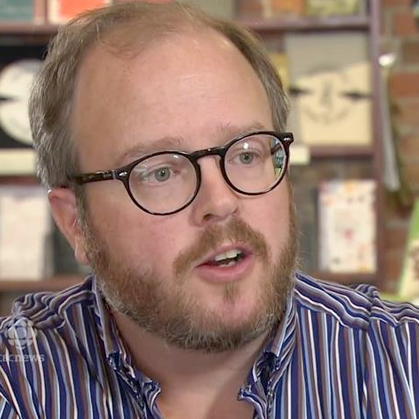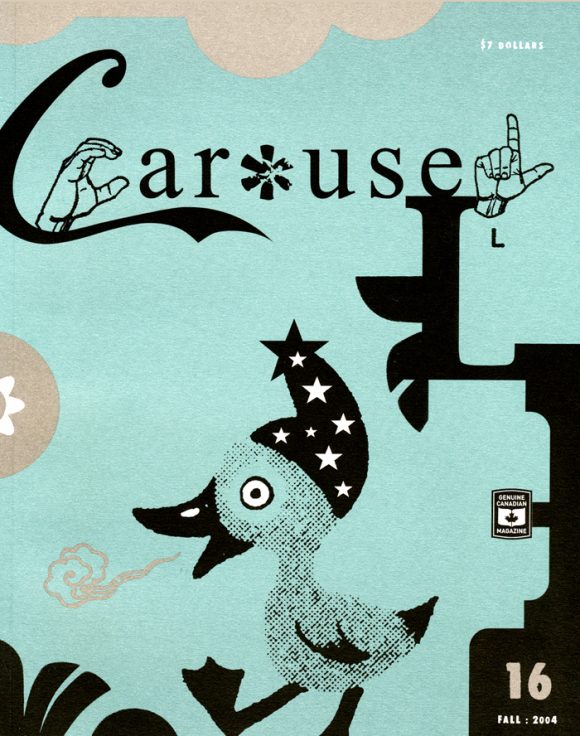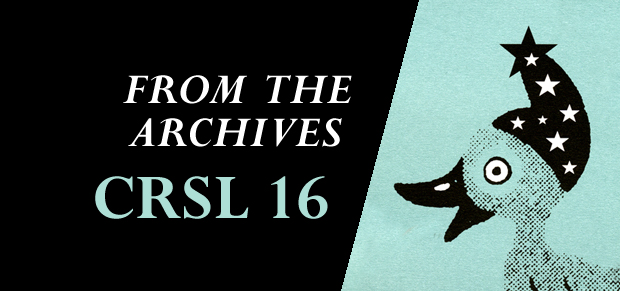From the Archive: Dan Wells (CAROUSEL 16)
DAN WELLS
Spare Change
There he was, once again. Sitting on his bench, clothed in a knatty white dress shirt, collar curling like a dead leaf, dress pants cinched so tight they ballooned. He had a build for begging, emaciated limbs striking right angles, threatening to poke new holes in his clothing. He smiled at Paul, wished him a good morning. Paul scowled, locked the door behind him. Beggars were never good for business.
It was quiet downtown. A window cleaner wielding a squeegee like a barber stropped the soap and dirt from the face of the furrier across the street. A few people read papers, sipped cappuccinos on the patio of the CoffeePot. Not that things were often busier. Downtown was beginning to remind Paul of a vagrant’s teeth, brown and broken, rife with suspicious gaps. A few businesses tried cleaning things up, but new paint on old buildings was like fresh makeup on an old widow: it caked and flaked like rot.
When Paul had opened his jewelry store thirty years before, things had been different. The streets had been lined with shops and department stores, a chocolatier with homemade fudge and roasted-shelled peanuts that warmed your hand through the bag. A bakery filling the street every morning with the smell of good things and their windows with the breads, cakes and cookies Paul often brought home. Fine family restaurants. Now it was all bars, fast food stands, dollar stores. Or worse, boarded up windows and broken glass, forgotten For Lease signs.
He sold little these days. A bracelet when a lawyer forgot his wife’s birthday, a pair of earrings to the occasional tourist. Locals provided the bulk of his business, but they were no longer great purveyors of expensive jewelry. Paul had changed to meet their needs, trafficking in 10 karat, plate and zirconians, while keeping a few display cases of finer pieces. He changed his Yellow Pages ad to include watch repair and battery replacement. He moved into Doultons, bought occasional shipments of discount crystal. But most customers still left empty handed.
Paul looked out the window at the beggar. Your own personal mendicant, a customer had told him. And you know what that means. He can’t be mended. The beggar did not have the cup or hat of the kids down the street, coins jingling like rotary phones; he pocketed change directly. “Spare change for a coffee,” he called, but Paul was certain he was lying. Spying the suits and dresses with their cappuccinos and colombians, he took his chances with the brotherhood of caffeine.
Sometimes he simply asked for “spare change.” Most passersby ignored him. A few passed with coins ready, others stopped to dig into pockets and purses. These exchanges made Paul want to harangue the person giving away even a penny. Like the bag ladies feeding pigeons, they were only encouraging him.
It was the mendicant’s age, Paul realized, that he held against the man. He allowed the younger beggars more. They did not panhandle with the rigor of profession. They set up at different times and locations, a couple of the more colourful affecting English accents. When they had enough for whatever it was they wanted–video games and junk food, presumably, though there was always the chance they were leaving for darker preoccupations–they trundled off in a caravan of ripped jeans, Doc Martens and colourful bandanas.
The old mendicant, by contrast, was more regular than a banker. He was almost always at his bench by eight-thirty. Only bad weather drove him away. When he found someone sitting feeding the pigeons, he approached, scattering birds, and waited.
The mendicant. Bernie. An entire mythology surrounded him. He’d been an accountant, a lawyer, a banker. Respectable. Then something happened. His wife had died in a car accident. His daughter had drowned in the bathtub. He’d succumbed. Paul argued that if he’d really been a lawyer, an accountant, he would have a pension, or at the very least disability. Other lawyers and accountants downtown would recognize him. He would not have simply shown up one morning on his bench, as if the street had given him birth.
Mary came in a few minutes before ten. She hung up her coat and gave herself a quick check in the mirror before turning the sign. A neat, compact woman, she was still attractive, her gray-streaked hair brushed back off of her face. She’d been working the shop so long that there were customers who thought she owned it. Hers was the face at the counter when Paul fixed watches or did paperwork in the back. It didn’t bother him that some mistook her for the proprietor. She was what people expected: petite and elegant, she looked like she knew jewelry. Paul had registered the shock some people had when they saw him behind the counter, more like a plumber in his ill-fitting clothes than a jeweler. Appearances mattered, especially in his business, and there was little Paul could do about his. He was the opposite of elegance. He lacked a waist; his body came together in the middle like a child’s spin toy. His clothes never fit properly. His pants hitched low on his waist in obeisance to gravity. His shirt never remained properly tucked in, trailing from between his suspenders like a sign of retreat. He suffered not so much from a five o’clock shadow as a one-thirty variety. His hands seemed too substantial for fine work, more suited to less delicate tasks, like tenderizing mutton. Though his fingers were sensitive. He never fumbled as he drew a necklace or brooch from the counter, the jewelry disappearing into the white gloved expanse of his hands.
There was no rush of customers today. Paul spent most of the morning in the back repairing a couple of watches while Mary did inventory up front. The doorbell chimed a couple of times, the register ringing one less. When Paul came up to the front around mid-morning the mendicant was doing a brisk business. There were days Paul wondered if the mendicant made more than he did.
At one o’clock Mary left for lunch. The door chimed closed behind her, then opened again, and again. A young woman shopping for early Christmas presents purchased a couple pairs of earrings. A tourist picked up a gold Maple Leaf for her charm bracelet. When Mary returned her jacket hung off of her arm. It is a beautiful day, she said.
Paul looked outside. The mendicant was gone. The sun shone cloudless. Pedestrians walked by, sleeves rolled against the sun, sunglasses rummaged out of desk drawers for this last vagrant taste of summer. A couple walked by eating ice cream. Another passed on roller blades, a dog running alongside them. People trickled into the shop, faces Paul had not seen before. Mary sold another pair of earrings, and a young man put some money down on four crystal low balls that he said would complete his mother’s set. The bell chimed as the door closed behind the last customer.
“I think I’ll step outside a moment,” Paul told Mary. “Get a breath of air.”
Outside the air was warm and fragrant. People walked by in no particular hurry. The patio of the CoffeePot spilled onto the sidewalk as friends stopped to chat. Paul could almost ignore the boarded up shops, the feral sprays of graffiti.
A couple stopped in front of the shop, then entered. Paul smiled, but did not follow. He sat on the mendicant’s bench and folded his hands. People walked by. Sunlight trickled through the leaves. The breeze rustled the leaves to whisper. He turned his face up and closed his eyes. He drifted.
“For you.” Paul opened his eyes, jerked his head. A nerve burned up his neck like ore. When he reopened his eyes the periphery of his vision shaded black. But the man was still there.
“For you,” the man said again, a dollar between dark brown fingers. His other hand held the much smaller one of a little girl. She moved into the man when Paul looked at her. The dollar hung in front of Paul’s face. Instinctively, as he might swat a fly, he reached out and plucked it from the man’s fingers.
The man smiled and walked away. The little girl dragged behind him, walking almost backwards, watching Paul. They turned at the corner, disappearing from view. Paul looked at the coin. It seemed to melt into his palm. He thought about chasing the pair, explaining their mistake. But he didn’t. It took all of his energy to pull himself back into the shop. He left the dollar like toll.
When he left a pigeon hopped onto the bench, and pecking at the dollar found it to be no good.
It was not there when Paul closed the shop that evening.

Spare Change
appeared in CAROUSEL 16 (2004) — buy it here

